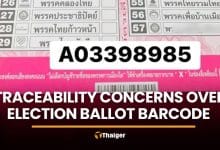EC dismisses complaints for party dissolution, insufficient evidence

The Election Commission (EC) has dismissed two of over ten complaints calling for the dissolution of certain political parties and the removal of the prime minister and some Cabinet members due to insufficient information.
Sawaeng Boonmee, the EC Secretary-General, stated that the office received more than ten complaints since the new government was established but two have been rejected. He did not elaborate on the specifics of these cases but mentioned that the complaints sought the dissolution of some parties and the removal of Prime Minister Paetongtarn Shinawatra and certain Cabinet members.
The EC office rejected the two complaints because they did not meet the criteria for valid complaints and appeared to only ask questions, Boonmee explained. He emphasised that anyone filing a complaint must specify the offences and which sections have been infringed. Simply citing information from newspapers and posing questions does not suffice.
“The agency will review the rest of the complaints without delay. If any complaints lack sufficient information or evidence, they will be dismissed at an early stage.”
One of the dismissed complaints alleged that the ruling Pheu Thai Party remained under the influence of former PM Thaksin Shinawatra, who is not a party member. On August 19, an anonymous petitioner filed the complaint, referencing the Constitutional Court’s ruling to remove Srettha Thavisin as prime minister on August 14.
The complaint accused former Thai premier Srettha of violating ethical standards by allowing a person, whom ex-lawyer Pichit Chuenban worked for, to dictate that Pichit be given the post of PM’s office minister. The court was referring to Thaksin, as Pichit served as his defence lawyer in a corruption case.
Thaksin’s influence
Furthermore, core members of Pheu Thai allegedly showed their respect and acceptance of Thaksin’s directions in media interviews, according to the complaint.
The organic law governing political parties states it is illegal for a non-party member to control, dominate, or instruct party activities in a way that directly or indirectly influences the party or its members.
On August 28, prolific petitioner Ruangkrai Leekitwattana asked the EC to evaluate Paetongtarn’s eligibility to hold the prime minister’s post, questioning the date of her resignation from positions in 21 companies within her family’s business empire.
Paetongtarn was elected Prime Minister of Thailand by the House of Representatives on August 16. Leekitwattana asked the commission to investigate whether Paetongtarn had resigned from all executive roles in the family’s companies by August 15 and why her resignation was only registered on August 19, three days after her election.
Meanwhile, Boonmee noted that the Bhumjaithai Party, a government coalition member, is unlikely to face dissolution due to allegations against its former Secretary-General, Saksayam Chidchob.
The party allegedly received unlawful donations from Burijarearn Construction, a company reportedly owned by nominees of Saksayam, who was found guilty by the Constitutional Court in January for asset concealment.
The EC’s inquiry team has been given extra time to collect and establish the facts, although Boonmee believes the complaint can be finalised within a month or two. He insisted that the case against Saksayam is not linked to the party in a way that would warrant dissolution.
“It is not the same as the Constitutional Court ruling against the now-dissolved Move Forward Party, which was disbanded for attempting to subvert the constitutional monarchy.”
Latest Thailand News
Follow The Thaiger on Google News:


























